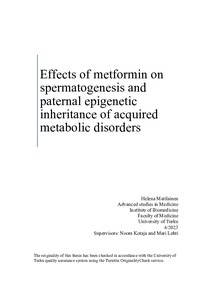Effects of metformin on spermatogenesis and paternal epigenetic inheritance of acquired metabolic disorders
Matilainen, Helena (2023-04-03)
Effects of metformin on spermatogenesis and paternal epigenetic inheritance of acquired metabolic disorders
Matilainen, Helena
(03.04.2023)
Julkaisu on tekijänoikeussäännösten alainen. Teosta voi lukea ja tulostaa henkilökohtaista käyttöä varten. Käyttö kaupallisiin tarkoituksiin on kielletty.
avoin
Julkaisun pysyvä osoite on:
https://urn.fi/URN:NBN:fi-fe2023040635493
https://urn.fi/URN:NBN:fi-fe2023040635493
Tiivistelmä
Somewhat controversial to the classical theory of genetic inheritance, human epidemiological data combined with experimental animal models have shown that along with genetic information, acquired conditions and traits can be transferred from parents to offspring. For example, parental traumatic stress and nutritional challenges have been shown to induce altered, sometimes disadvantageous phenotypes in the offspring. This phenomenon is today explained by epigenetic germline inheritance, and data regarding transmittable phenotypes and underlying causal mechanisms is building up. During recent years, a growing body of research has focused on paternal epigenetic inheritance. Epigenetic modifications in paternal gametes can be induced by different environmental factors, such as toxins, nutrition, and stress-related conditions. How the health status of the father is then passed on to the offspring has not yet been fully clarified, however, certain mechanistic vectors being responsible for transferring epigenetic information to the offspring have been identified, the most well-established ones being DNA methylation, histone modifications and non-coding RNAs (ncRNAs).
In this study, male mice were put on either high-fat diet (HFD) or low-fat diet (LFD), after which a metformin intervention was carried out. The main objective of this study was to control whether metformin caused significant disturbances in testis histology of studied mice. This study acted as a preliminary experiment for a greater study aspiring to investigate whether disadvantageous paternal epigenetic inheritance of metabolic disorders could be prevented using different interventions. To estimate the potential of metformin as a method to prevent unwanted paternal epigenetic inheritance of metabolic disorders, it is crucial that metformin itself will not cause defects in spermatogenesis. The second main objective of this study was to isolate germ cells for further ncRNA analysis included in the bigger study. Testis histology was studied in periodic-acid Schiff (PAS) as well as immunofluorescence-stained testicular tubule cross-sections. No critical defects in testicular histology of metformin-treated mice came across in comparison to other mice included in the study, therefore, metformin could be a potential intervention method in study settings aspiring to prevent disadvantageous paternal epigenetic inheritance. In addition, germ cell samples containing adequate amounts of wanted germ cell types (round spermatids) were isolated and can be used for further down-stream analysis.
Key words: paternal epigenetic inheritance, metformin, testis histology, spermatogenesis
In this study, male mice were put on either high-fat diet (HFD) or low-fat diet (LFD), after which a metformin intervention was carried out. The main objective of this study was to control whether metformin caused significant disturbances in testis histology of studied mice. This study acted as a preliminary experiment for a greater study aspiring to investigate whether disadvantageous paternal epigenetic inheritance of metabolic disorders could be prevented using different interventions. To estimate the potential of metformin as a method to prevent unwanted paternal epigenetic inheritance of metabolic disorders, it is crucial that metformin itself will not cause defects in spermatogenesis. The second main objective of this study was to isolate germ cells for further ncRNA analysis included in the bigger study. Testis histology was studied in periodic-acid Schiff (PAS) as well as immunofluorescence-stained testicular tubule cross-sections. No critical defects in testicular histology of metformin-treated mice came across in comparison to other mice included in the study, therefore, metformin could be a potential intervention method in study settings aspiring to prevent disadvantageous paternal epigenetic inheritance. In addition, germ cell samples containing adequate amounts of wanted germ cell types (round spermatids) were isolated and can be used for further down-stream analysis.
Key words: paternal epigenetic inheritance, metformin, testis histology, spermatogenesis
